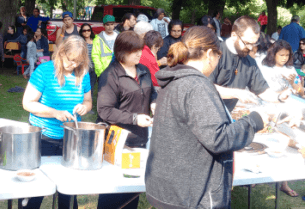At the height of the crisis, more than 115 wildfires were burning in Saskatchewan, triggering the biggest evacuation effort in the province’s history.
The fires raged in areas where Anglicans have a significant presence, including communities such as Stanley Mission, Sucker River and Hall Lake where the Anglican Church is the only local church. A number of families lost their homes, including from Montreal Lake Cree Nation, where Diocesan Indigenous Bishop of Missinipi Adam Halkett resides.
Anglican churches provided strong support to local relief efforts while praying for those affected. Bishop Adam and Bishop of Saskatchewan Michael Hawkins spearheaded the church’s on-the-ground support.
A large number of evacuees resided in emergency shelters in communities such as Prince Albert, Saskatoon, Regina and Lloydminster in Saskatchewan and Cold Lake in Alberta.
In Cold Lake, the local Anglican church made an extensive effort to help evacuees, providing bag lunches and other supplies for the seven-hour bus ride back to La Ronge. Meanwhile, members of the Saskatchewan diocese offered extra support.
“We went to visit them to find out how they were doing, just to connect with them,” Bishop Adam said.
In Prince Albert Bishop Adam was active helping evacuees, inviting them to Sunday services at St. Alban’s Cathedral and organizing traditional meals of wild meat, moose meat or fish.
Anglicans from Birch Hills and Muskoday, along with members of the Roman Catholic Church in Birch Hills, fed approximately 500 people at an outdoor concert to entertain evacuees and raise funds for the relief effort. Many evacuees had to leave their homes quickly and were left without weather-appropriate clothing or items for children.
Anglican clergy also visited people outside of Prince Albert—taking communion to elders in cities such as Saskatoon and visiting the evacuees in Cold Lake – and provided basic necessities such as food and water.
At the invitation of Grand Chief Ron Michel, Bishop Michael and Bishop Adam sat in at one of the daily emergency meetings at the Prince Albert Grand Council, which represents 12 First Nations with about 30,000 members in northern Saskatchewan. The Council supplemented the efforts of the Red Cross by providing meals, clothing, blankets and shelter. It also transported evacuees, gave medical care and helped firefighters battle the conflagrations.
“We [continued] to provide them with moral support,” Bishop Michael said. “We’re blessed with some really fine … leadership in the Grand Council and in the nations, as well as in the towns and villages in the north … They [did] a tremendous job.”
Throughout the ordeal, Canadian Anglicans offered support for the wildfire relief efforts.
Bishop Michael estimated that the diocese had received and distributed $35,000 worth of donations, including from the General Synod of the Anglican Church of Canada, the Primate’s World Relief and Development Fund and the Anglican Foundation of Canada.
“The support that we’ve received, both in terms of prayer and finances, has been overwhelming,” Bishop Michael said. “There’s really been a sense of solidarity. We talk in the diocese of Saskatchewan about being mamuwe, which is Cree for ‘together,’ and there’s a real sense that Anglicans across the country [were] together with our folks in this crisis.”
The donations are “a sign of a church family across the country that cares deeply about what’s happening in the context of a church local,” said Archbishop Fred Hiltz, primate of the Anglican Church of Canada, in an interview. “Relief and development is not just what we do around the world—it’s what we have to do, sometimes, right in our own backyard.”
Though some fires are still burning and are expected to continue in the coming weeks or even the first snow, by the end of July the immediate crisis was over.
The diocese was planning to provide cash support to every family that lost its primary residence to the fires in order to help them re-build, Bishop Michael said.
He also said the most significant aspect of the experience for Saskatchewan and the Anglican Church of Canada was how people rallied together across the province.
“We had fire departments from reserves and cities and villages and towns who united to fight the fires,” he commented. “It was very moving to see rural, non-Indigenous people fighting fire side by side with their Indigenous neighbours, and I think that has a real potential to make a lasting difference in the province.”
But as a result, residents from diverse backgrounds united to meet the challenge.
Drawing parallels between the wildfires and other crises facing northern Saskatchewan, Bishop Michael has urged residents to build on the solidarity engendered through their response to the fires.
“The forest fires are one thing that threatens our homes and communities,” he said. “But we’re also threatened continually by drugs and violence, by suicide and alcohol, racism, poverty, and the like … Whatever’s come out of this crisis and the desire to address that needs to be harnessed for us to work together to fight those fires to protect people.”
The Primate’s World Relief and Development Fund are part of the Anglican Alliance’s family of churches and agencies working on relief, development and advocacy around the Communion. You can read more about their response to the Saskatchewan wildfires and contribute to their appeal here.
Photo: Residents of Birch Hills and Muskoday, including many Anglicans, serve up food at a fundraising concert for northern Saskatchewan residents evacuated due to wildfires. Credit: Anglican Church of Canada

